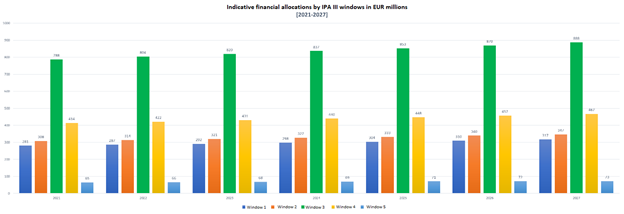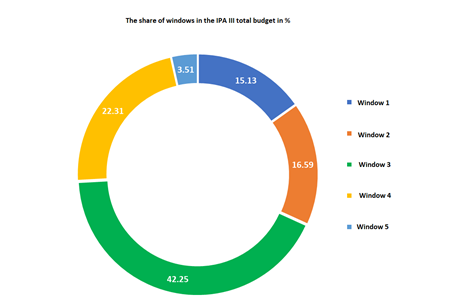IPA III
The IPA III is the third generation of the EU pre-accession assistance instruments to the countries of the Western Balkans and Turkey. The budget amounts to EUR 14.2 billion for the seven-year period (2021-2027). With this instrument, the EU continues to financially support legal, economic and social reforms in candidate and potential candidate countries, enabling them to meet the criteria for the EU membership.
IPA III WINDOWS AND THEMATIC PRIORITIES
The IPA III assistance is programmed according to five thematic windows, which mirror the objectives and the new EU enlargement policy. These windows are complementary to one another. Each window contains a number of designated thematic priorities that are exclusive to each of the IPA III beneficiary countries, and reflect various aspects of the EU acquis and policies.
Window 1: Rule of law, fundamental rights and democracy
Thematic priorities
- Judiciary
- Fight against corruption
- Fight against organised crime
- Migration and border management
- Fundamental rights
- Democracy
- Civil society
Window 2: Good governance, EU acquis alignment, good neighbourly relations and strategic communication
Thematic priorities
- Good governance
- Administrative capacities and acquis alignment
- Good neighbourly relations and reconciliation
- Strategic communication, monitoring, evaluation and communication activities
Window 3: Green agenda and sustainable connectivity
Thematic priorities
- Environment and climate change
- Transport, digital economy and society, energy
Window 4: Competitiveness and inclusive growth
Thematic priorities
- Education, employment, social protection and inclusion policies, and health
- Private sector development, trade, research and innovation
- Agriculture and rural development
- Fisheries
Window 5: Territorial and cross-border cooperation
Thematic priorities
- Promoting employment, labour mobility, social and cultural inclusion across the border
- Protecting the environment, promoting climate change adaption and mitigation, risk prevention and management
- Promoting sustainable transport and improving public infrastructures
- Promoting digital economy and society, inter alia through digital connectivity, development of e-administration services, digital trust and safety, including digital skills and entrepreneurship
- Encouraging tourism and cultural and natural heritage
- investing in youth, education and skills through, inter alia, developing and implementing joint education, vocational training, training schemes and infrastructure supporting joint youth activities;
- promoting local and regional governance and enhancing the planning and administrative capacity of local and regional authorities;
- enhancing competitiveness, the business environment and the development of SMEs, trade and investment through, inter alia, the promotion of and support to entrepreneurship, in particular in relation to SMEs, and the development of local cross-border markets and internationalisation;
- Strengthening research, technological development, innovation and digital technologies.
FINANCIAL ALLOCATIONS
The principle of indicative financial allocations by countries is replaced by the principle of indicative financial allocations by windows in the IPA III, common to all IPA beneficiary countries. The proportion of these indicative amounts channelled to individual IPA III beneficiary countries depends on their progress in reforms implementation, particularly fundamental ones in the fields of the rule of law, public administration reform, and sustainable economic development and competitiveness.
Overview of financial allocations by IPA III windows (2021-2027)


FINANCIAL FRAMEWORK PARTNERSHIP AGREEMENT
The Financial Framework Partnership Agreement provides for the rules and related obligations of the IPA III beneficiary countries in relation to planning, programming, implementing, monitoring, evaluation and reporting of Union assistance under the IPA III. The European Commission concludes the agreement with each the IPA III beneficiary country separately. Entering into force of the agreement is precondition for granting and using the IPA III assistance. The Financial Framework Partnership Agreement is a model agreement which is the same for all the IPA beneficiary countries. By concluding it, the beneficiary country is obliged to implement it consistently which also includes legislative alignment.
The Financial Framework Partnership Agreement between the European Commission and Bosnia and Herzegovina on specific arrangements for implementation of Union financial assistance to Bosnia and Herzegovina under the Instrument for Pre-Accession Assistance (IPA III) was concluded and entered into force on 22 September 2022. (Official Gazette of BiH, international agreements, 7/22).
FINANCIAL AGREEMENTS
The beneficiary country and the European Commission conclude financial agreements for the annual IPA III assistance programmes in order to use the assistance approved by the European Commission for the beneficiary country under the IPA III. The financial agreement governs principles and conditions for granting the assistance under IPA III which includes methods and deadlines of implementation as well as actions - projects to be supported.
IPA III PLANNING AND PROGRAMMING
The IPA III planning and programming is based on the IPA III Programming Framework, Strategic Response of beneficiary country, preparation of Action Fiches and Action Documents.
IPA III PROGRAMMING FRAMEWORK
The IPA III Programming Framework is the key strategic document based on which the IPA III is planned and programmed for all beneficiary countries. The document is prepared and adopted by the European Commission for the entire duration of IPA III. The IPA III Programming Framework defines general and specific objectives of assistance for all the IPA windows and the accompanying thematic priorities, types of actions eligible for funding under IPA III and unique indicators at the level of windows and thematic priorities.
The IPA III Programming Framework replaced indicative strategy papers prepared individually for each IPA II beneficiary country. This strongly emphasises the purpose of assistance under this instrument and the fact that the EU membership criteria and the obligations arising from the EU acquis are the same for all candidate and potential candidate countries.
IPA III STRATEGIC RESPONSE
The IPA III Strategic Response is a document prepared by the IPA beneficiary country in response to how the country plans to use the IPA III assistance in the seven-year budget period.
The Strategic Response form consists of two thematic units and each unit follows the IPA III window structure: The IPA III beneficiary country provides the background for that IPA III window in the first unit, including an analysis of the beneficiary country strategic framework's compliance with EU enlargement policy goals, regional and global strategy goals, and sectoral approach principles. The beneficiary country provides an overview of actions/action fiches in the second unit that will be funded over the following four years through the IPA III.
The Strategic Response is four years working planning document. It is regularly updated but not adopted and it is basis for programming and granting IPA III assistance. The Action Fiches are attached to the Strategic Response.
ACTION FICHE AND ACTION DOCUMENT
The Action Fiche is a form used to submit an action proposal for assessment of the strategic relevance by the European Commission. This document provides basic information about the action along with information relevant for the assessment of the action fiche's strategic relevance, i.e. compliance of the action fiche with the goals of the beneficiary country's countrywide strategies, EU strategic documents, enlargement instruments, and regional and global strategies.
The Action Document/project proposal is a form for preparing a full project proposal, following a positive assessment of the action fiches’ strategic relevance by the European Commission. The Action Document should provide relevant information to assess the technical maturity of full project proposals, and any additional information necessary for the assessment of strategic relevance. The European Commission makes a final decision to accept project proposals planned and programmed by the beneficiary county under IPA III.
STRATEGIC RELEVANCE AND TECHNICAL MATURITY CRITERIA
In order to be eligible for funding under the IPA III, all project proposals that the beneficiary country proposes during the IPA III planning and programming should meet the criteria of strategic relevance and technical maturity.
Strategic relevance of the action fiche and project proposal is assessed by whether the proposed interventions contribute to the achievement of the IPA III Programming Framework goals, countrywide sector strategies, priorities arising from EU enlargement instruments, UN sustainable development goals, regional and global strategy goals, and the development of a sectoral approach.
Technical maturity
The technical maturity of project proposals indicates that the public procurement procedure for the project activities implementation can be initiated immediately after signing a financial agreement.
Institutional maturity is particularly appreciated in terms of sufficient number of engaged stuff with expertise and competencies and appropriate legislative and institutional framework for the sector policies implementation. In addition, other documents are also appreciated, such as technical specifications for individual procurements provided for in the project, descriptions of project task or action, twinning specifications, budget specifications for infrastructure projects, evidence of resolved property-legal issues, etc. These documents are submitted to the European Commission along with project proposals.
STATE IPA
The pre-accession assistance is directed through annual State aid programmes, i.e. action plans for funding in favour of beneficiary country. The European Commission adopts the decision on the State aid programme with the accompanying approved action documents (project proposals).
For the overview of approved action documents (project proposals) for the IPA 2021 and 2022 click here: https://neighbourhood-enlargement.ec.europa.eu/enlargement-policy/overview-instrument-pre-accession-assistance/bosnia-and-herzegovina-financial-assistance-under-ipa_en
MULTI-COUNTRY IPA
In addition to individually supporting candidate and potential candidate countries for EU membership, the European Union provides financial and technical assistance with the aim of implementing joint (regional) priorities of the IPA III beneficiary countries.
This support is provided from the multi-country IPA, which aims to enhance regional cooperation and address issues of general interest to all IPA beneficiaries. The multi-country IPA programme is implemented in such a way that projects are implemented jointly in all IPA programme beneficiary countries, and not in each country separately. Multi-country IPA programme beneficiaries are: Albania, Bosnia and Herzegovina, Montenegro, Kosovo*, North Macedonia, Serbia and Turkey. The preparation and implementation of the multi-country programme is done in line with the direct governance model, where the European Commission prepares, implements and monitors the implementation of multi-country IPA projects.
IPA III LEGAL FRAMEWORK
The EU legal framework for the establishment and implementation of the IPA III consists of:
 Bosna i Hercegovina
Bosna i Hercegovina 
